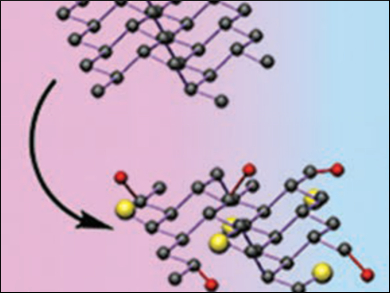Elevated levels of transition metals are a factor in neurodegenerative diseases such as Alzheimer’s disease or Parkinson’s disease. Copper, for example, can cause oxidative stress and damage nerve cells. Capturing excess copper could help, but drugs used for this purpose need to be able to cross the blood–brain barrier.
Liu Deng and You-Nian Liu, Central South University, Changsha, Hunan, China, Shaojun Guo, Beijing University, China, and colleagues have used black phosphorus (BP) nanosheets as a neuroprotective nanodrug that can capture Cu2+ ions. The team obtained BP nanosheets by ultrasonication-assisted liquid exfoliation from bulk black phosphorus. Experiments in aqueous solutions showed that the nanosheets can efficiently and selectively capture copper ions. They also act as an antioxidant and prevent the formation of reactive oxygen species (ROS), which can damage cells.
The researchers were able to exploit the photothermal effect of BP nanosheets using near-infrared (NIR) irradiation to raise the temperature around the nanodrug. This improves the blood–brain barrier permeability of the nanosheets. The nanosheets are stable and biocompatible and, according to the team, could have potential as an efficient nanodrug for the treatment of neurodegenerative disorders.
- Black Phosphorus Nanosheets as a Neuroprotective Nanomedicine for Neurodegenerative Disorder Therapy,
Wansong Chen, Jiang Ouyang, Xinyao Yi, Yan Xu, Chengcheng Niu, Weiyu Zhang, Liqiang Wang, Jianping Sheng, Liu Deng, You-Nian Liu, Shaojun Guo,
Adv. Mater. 2017.
DOI: 10.1002/adma.201703458


